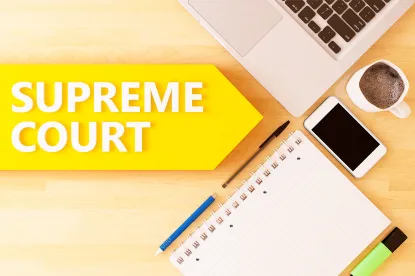On July 6, 2020, the United States Supreme Court affirmed a ruling by the Court of Appeals for the Fourth Circuit, which found that an exception allowing government debt-related robocalls to cell phones is unconstitutional and must be severed from the rest of the Telephone Consumer Protection Act of 1991 (“TCPA”). Barr v. Am. Assn. of Political Consultants, Inc., No. 19-631, — S.Ct. —- (2020). Though the Court severed the offending exemption from the rest of the TCPA rather than invalidating the entire TCPA, the Court’s opinion provides a roadmap to making similar constitutional attacks on other portions of the TCPA, including regulations implemented by the Federal Communications Commission (“FCC”).
The TCPA generally prohibits calls and text messages to cell phones using an automatic telephone dialing system or an artificial or prerecorded voice, i.e. robocalls. As Justice Kavanaugh put it, the TCPA imposes “tough” statutory penalties of $500 per call or text in violation, or up to $1,500 per call/text for a knowing or willful violation. Such statutory penalties make the TCPA favored among consumer class action plaintiffs’ counsel. The TCPA applies not only to marketing calls, but most other kinds of calls, including debt collection calls. In 2015, Congress added a government-debt exception for calls made solely to collect a debt owed to or guaranteed by the United States.
In this case, the American Association of Political Consultants, Inc., and other political and nonprofit organizations (the “Plaintiffs”) sued the United States Attorney General and the FCC (the “Government”), arguing that the government-debt exception violated the First Amendment by favoring debt-collection speech over political and other speech. The Plaintiffs argued that the proper remedy would be to invalidate the entire TCPA rather than merely severing the government-debt exception.
The case originated in the U.S. District Court for the Eastern District of North Carolina, which held that the government-debt exception did not violate the First Amendment, even though it applied strict scrutiny review to the exception as a content-based restriction on speech. Am. Ass’n of Political Consultants v. Sessions, 323 F. Supp. 3d 737 (E.D.N.C. 2018). The U.S. Court of Appeals for the Fourth Circuit vacated that judgment. Am. Ass’n of Political Consultants, Inc. v. FCC, 923 F.3d 159, 167 (4th Cir. 2019). The Court of Appeals agreed that the government-debt exception constitutes content-based speech restriction, but found that the exception failed strict scrutiny review and ordered it severed. The Government then petitioned for writ of certiorari.
Writing for the Court, Justice Kavanaugh explained that the First Amendment prohibits content-based restrictions on speech based upon “its message, its ideas, its subject matter, or its content” and concluded that the government-debt exception is content-based. In particular, a law is content-based if “a regulation of speech ‘on its face’ draws distinctions based on the message a speaker conveys.” The Court explained that under the TCPA, a robocall, which says, “Please pay your government debt” is legal while a robocall that says “Please donate to our political campaign” is illegal. Accordingly, the Court found that the government-debt exception is an unconstitutional content-based restriction that favors government-debt collection speech over other speech.
Having so concluded, the Court then turned to the question of whether the entire TCPA should be invalidated or whether the problem could be cured by severing the government-debt exception from the rest of the TCPA, as the Fourth Circuit had concluded. Because the TCPA was an amendment to the Communications Act, which contains an express severability clause, the Court concluded that it was required to sever the offending provision.
The Court noted that even if the severability clause did not exist or did not apply to the government-debt exception, its “precedents reflect a decisive preference for surgical severance rather than wholesale destruction, even in the absence of a severability clause.” Under that presumption, the Court explained it would sever the exception from the rest of the TCPA, as the remainder of the law “is capable of functioning independently” and did in fact “function independently . . . 20-plus years before the government-debt exception was added in 2015.”
Accordingly, the Court affirmed the judgment of the Fourth Circuit. Several Justices wrote separate opinions, indicating that, while the majority agreed that the government-debt exception is unconstitutional, they did so for different reasons. Notably, Justice Gorsuch, joined by Justice Thomas, opined that rather than severing the exception, the Plaintiffs should have been entitled to an injunction, preventing the enforcement of the TCPA against them.
What does this mean? As a result of this ruling, the Plaintiffs here “still may not make political robocalls to cell phones, but their speech is now treated equally with debt-collection speech.” This ruling may also open up similar challenges to other portions of the TCPA, including FCC regulations. For example, FCC regulations require a heightened level of prior express written consent for marketing calls, not required for debt collection calls. Are such content-based restrictions similarly unconstitutional? In his opinion, Justice Gorsuch properly noted anachronisms found in the TCPA and its implementing regulations. Whatever justification that may have existed in 1991 when the TCPA was enacted may no longer suffice to support content-based restrictions on free speech. Though the TCPA has survived the day, it may die a death of a thousand such cuts.




 />i
/>i

